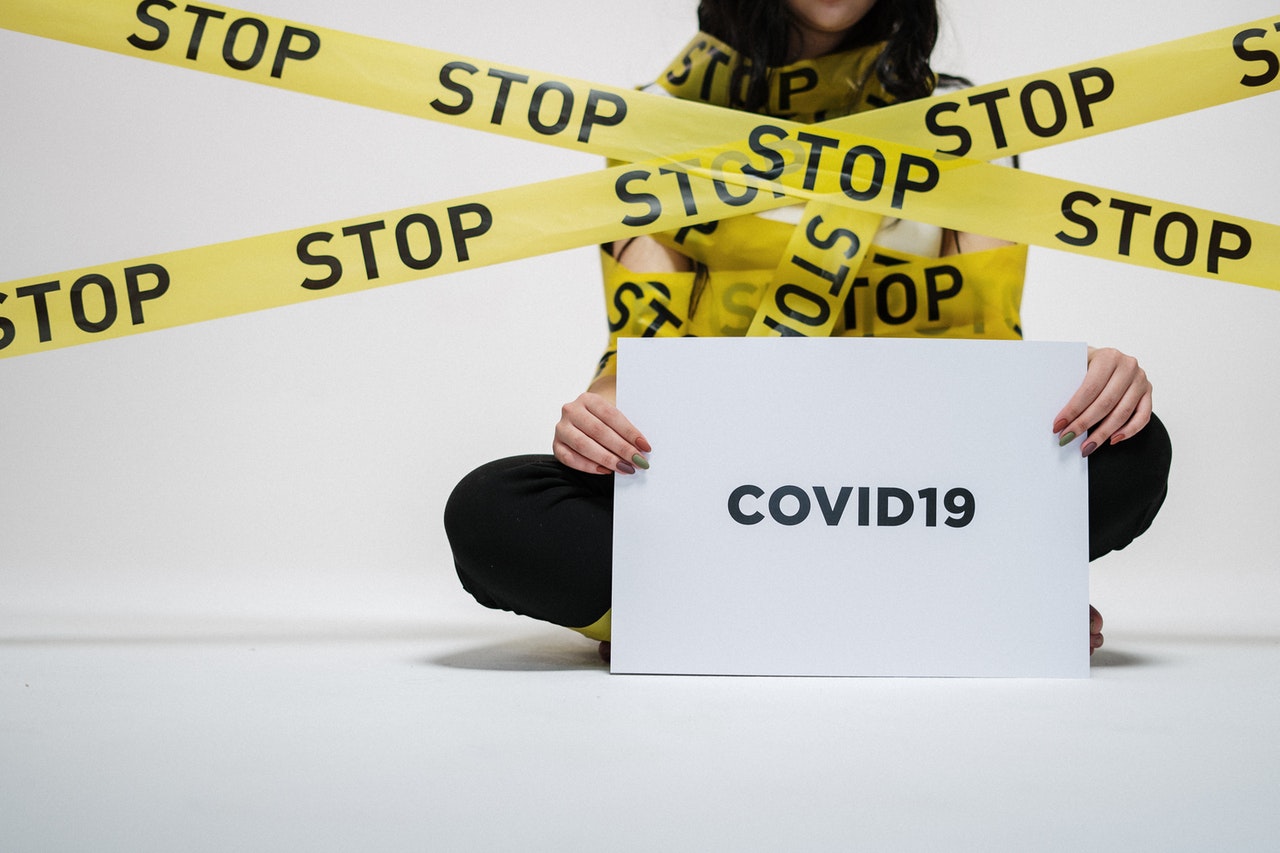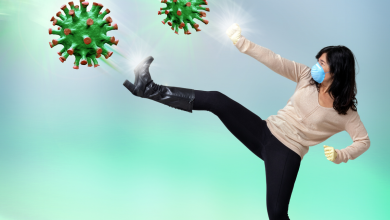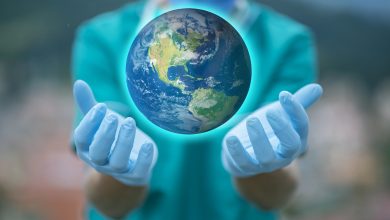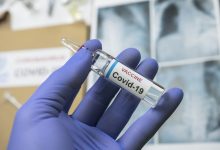Must Know Myths About Coronavirus

As we all know, this disease has so far claimed many lives and caused a lot of tension in the world. And to the say the least we are just scratching the surface so far. In the absence of sure shot cure or vaccine, it is difficult to gauge how far this will stretch. By now, almost every country has a case and there has hardly been a respite in the numbers. Few things, however, are very disturbing, e.g., how much hate, lies, and fake news have gone viral besides the virus itself. In this article, let us learn some of these crazy notions which are doing the rounds and their solutions as per the World Health Organization (WHO).
1) Wearing masks while exercising
What masks can do while a person is heavily breathing during exercise is blocking the necessary fresh air supply to the lungs when its the most needed. The sweat accumulated on the inside of the mask only adds to the growth of microbes and hence adding fuel to the fire. Hence, never wear a mask while exercising and always maintain at least 1-meter distance from fellow exercisers.
2) Prolonged mask use causing O2 deficient state or CO2 intoxication
This is actually a bizarre allegation because no mask is airtight. If worn properly, the gaps on the sides are sufficient for enough air to percolate while breathing normally, without letting many microbes in. So, if your body is well perfused with oxygen, don’t worry about the CO2.
3) Its really a virus, not bacteria
The fact that there’s no antibiotic that effectively cures this disease tells us that the disease in question is definitely not caused by bacteria. Bacteria are killed by antibiotics by one mechanism or other, but not viruses. Furthermore, there is plenty of microbiological and microscopical evidence isolated from conformed patients to prove it and show the virus itself. Some opportunistic bacteria can affect the patients later in the disease owing to lowered immunity, in which case the physician may then need to prescribe antibiotics.
4) Can alcohol protect against COVID-19?
It goes without saying that there are several health hazards related to alcohol consumption. Hence, there’s no way that it can protect against this or most of other diseases. For what its worth, staying away from alcohol will only help you from accidentally contracting COVID-19 while you’re at the wine shop, in the market, unnecessarily socializing, or even touching bottles without sanitizing.
5) Can shoes bring in the virus?
Shoes are a kind of fomite and very limited studies persist to prove or disprove any claim regarding shoes bringing in the virus when you enter a place wearing them. So, unless any evidence-based proof is available to say for sure, it will be safe to say that it is better to leave the footwear outside your homes and then enter, especially when you have children who crawl or play on the bare floor.
6) Role of Thermal Scanners
It would not be completely wrong or right to say that thermal scanners are useless in detecting COVID-19, because the role of this instrument is only to detect fever i.e., higher than normal body temperature. Undoubtedly, it may be a pointer towards COVID-19, but we cannot disregard the fact that the fever could also be due to multiple other reasons and ailments. If one experiences fever which is detected by this instrument, it is better to approach the local physician to check for other clinical signs and symptoms which correlate with this disease.
7) Peppers are helpful to prevent?
While the herbs and spices, which a lot of people have propagated as a protectant from coronavirus, are good to build up your natural immunity, there is still no proof as per the studies to correlate these ‘magical’ claims. Have them for their taste and immune-boosting potential, if you still insist.
8) Garlic and its utility?
Doubtlessly, garlic does have antimicrobial properties, but it has not showed any relief in Coronavirus cases. Adding it to meals for overall immunity building is okay, but do not rely on any false claims with regards to curing COVID-19.
9) Medicines as a cure?
Till date, the studies have not concluded whether to accept or refute any potential drug as a confirmed cure in 100% of the cases. The treatments are evolving as we speak but the sure-shot cures and guidelines for usage are yet to be delineated. It’s only a matter of time till it is found, but until then we have to be patient.
10) Can houseflies spread COVID-19?
So far, there is no evidence whatsoever that houseflies are potential vectors for transmission of this disease. Touching unclean surfaces and fomites are touted as the usual culprits, but not flies. So rather than swatting flies, it would rather help to maintain the cleanliness of our surroundings and ourselves are per the required norms in order to keep away from Coronavirus.
11) Mosquito bites spread nCoV?
Neither has there been any evidence to prove this nor have there been any studies to favour this claim. If a mosquito bites an infected person, still there are no proofs to say for sure that if the same mosquito bites a healthy person thereafter, the latter runs a risk of contraction.
12) Are disinfectants and bleaches helpful if sprayed or consumed?
These entities have no effect on the virus but are rather harmful when ingested or applied. Keep them away especially from eyes and mouth, and children, so that they are not accidentally consumed because they are inevitably poisonous. Cleaning surfaces indoors should be done carefully, too.
13) Virus does not survive in hotter regions?
There have been cases in countries with all kinds of weather, be it hot or cold. Therefore, there is nothing to prove this claim to be correct because the virus has affected millions across several nations with diverse climatic conditions. Temperatures of more than 250C do not ensure any protectivity from this virus.
14) Virus dies in cold weather or places?
This again has not been seen so far because the natural cold climates have not had any significant effect on the virus morphology as per the WHO and any kind of studies.
15) The 10 sec breath-holding test?
If it would be this simple to detect coronavirus, we would have had a real breakthrough by now instead. Thus, unfortunately, holding your breath for 10 seconds is not enough to prove or disprove the infection from Coronavirus. Currently, there is no shortcut method to detect COVID-19 except the laboratory tests itself.
16) Our UV lamps effective in killing Coronavirus?
De facto, UV light is harmful to the skin and can potentially cause irritation of the skin and eyes. It is, thus, advisable to keep away from them when aiming at the disinfection of skin surfaces. A much easier, cheaper, and effective method is to simply wash your hands with soap and clean water.
17) Hand dryers and their stance?
Nope, these do not work, too. So far, there has not been anything to suggest or prove their effectiveness in killing the virus in question.
18) Saltwater and its effectiveness?
It has been long known that saltwater or saline gargles and nose rinse are good to allay common cold, but COVID-19 is not your regular flu. No matter its benignity, there is still no evidence that saline rinse can effectively flush out the virus from our nasal or oral cavities, irrespective of the frequency of this exercise.
19) Does age have any relation to vulnerability to coronavirus?
Humans in all age groups have been affected so far. From neonates to centenarians, none of them has been spared by its spur. Yet, the vulnerability is more in people with simultaneous comorbidities like diabetes, hypertension, heart disease, asthma, etc. Maintaining proper hand and respiratory hygiene is a must for all in this phase.
20) Oxygen saturation levels and their correlation?
This pandemic has put a new word in people’s dictionary- oxygen saturation! Earlier, except the medical community, no one was aware of this until this phase started to blow up. Most definitely, there is a correlation with the drop in oxygen saturation levels which can be judged by a simple pulse oximeter from the confines of our homes, but citing COVID-19 as the only reason for its drop is illogical. There are numerous diseases that can cause this. One should be careful about the clinical picture as well. If nothing adds up, its always better to approach your nearest medical center for further tests.
How many of these myths have we come across in our daily lives while observing the lockdown norms, and did not know what to believe or refute? World Health Organization has been giving out clear information regarding every new myth as and when it was touted or uncovered. Social media has made it more and more easy to spread good as well as irrelevant news. It is our job to investigate or at the very least question any claims before believing anything. Credibility of the source matters a great extent. Incorrect concepts can be dangerous in this phase, so always beware and remember to stay home, stay safe!
This article is written by Dr. Aafreen Kotadiya
For daily awareness and motivational posts connect with us on Facebook – Twitter and Instagram
Like this post? Or have something to share? Write to us via email: submit@sharetoaware.com
For more stories like this, visit our home page.
Don’t Forget To #ShareToAware
Disclaimer: Suggestions and tips mentioned in this article are for general information and awareness purposes only and should not be construed as professional medical advice. Always consult your professional healthcare provider or doctor if you have any specific questions about any medical matter.








